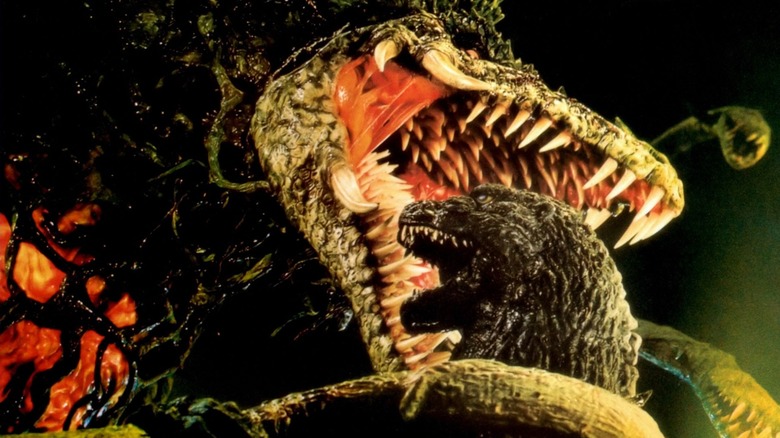
With their memorable roars and towering heights, kaiju (aka giant monsters) continue to have an endearing impact on cinema. Whether it be their silly theatrical presentations or their terrifying on-screen personas, kaiju are among the most unique pop culture creatures to ever exist. From "King Kong" to the immortal "Godzilla," every one of these massive movie stars has not only inspired kids' imaginations, but also spurred great filmmakers to tell their stories in the most fascinating of ways.
However, the question remains: Which among the plethora of kaiju movies is the best of the best? That's harder to define than Godzilla's actual height. But, while it would take forever to examine every one of the great giant monster movies, the picks on this list continue to excite fans both young and young at heart. No matter where you are in your kaiju journey, these movies deserve some giant-sized respect.
The Giant Claw
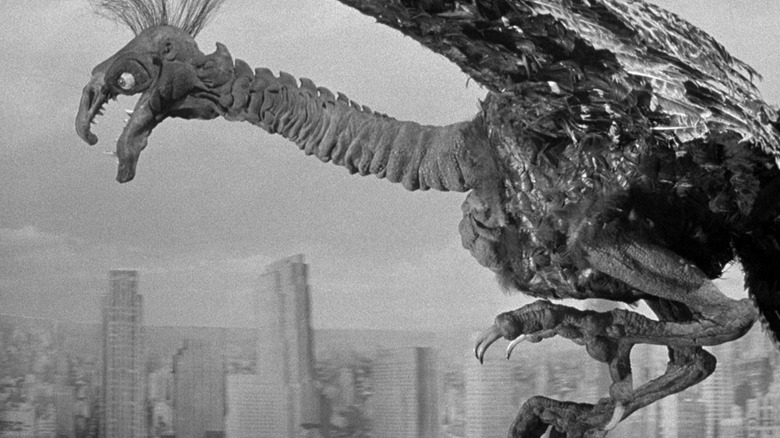
While most of the films on this list are of a certain quality, there's nothing quite as spectacular as a ridiculous, schlocky giant monster movie. And with its over-the-top aesthetic presentation, Fred F. Sears' "The Giant Claw" is truly a sight to behold. In the movie, engineer Mitch MacAfee (Jeff Morrow) notices strange activity in the skies, leading to a UFO sighting. Suddenly, a series of planes go missing, sending Mitch and other experts into the field to hunt for the creature responsible: a monstrous bird from another galaxy.
Is it as masterful as the top-tier choices later on this list? Absolutely not. But it's the flaws within "The Giant Claw" that make it charming from start to finish. With its terrifyingly horrendous creature design, the marionette-based special effects work, and the cheap budget, it's a genre film that will likely never leave your memory. But it's the hilarious cinematography choices, the corny narrator, and the dialog that make "The Giant Claw" a smile-inducing kaiju flick.
Godzilla: King Of The Monsters (2019)
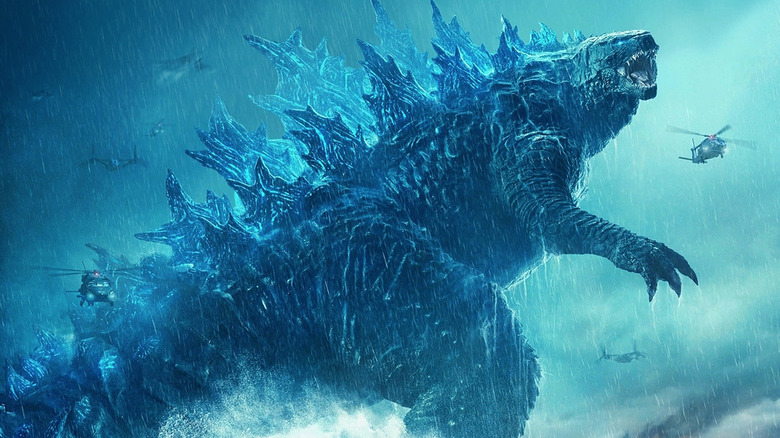
Serving as a sequel to Gareth Edwards' "Godzilla," this second installment in Legendary's MonsterVerse reintroduces audiences to the titular monster in the grandest of fashions. Taking place five years after the first film, the world is still in a frenzy over the first Godzilla encounter. But with new monster threats on the loose, including the mythical King Ghidorah, the monster experts at Monarch (along with the rest of humanity) must rely on the help of Godzilla to defeat his other giant-sized foes.
While Hollywood hasn't always cracked the kaiju formula, "Godzilla: King of the Monsters" is the Tinseltown produced Godzilla film that gets things more right than wrong. Not only does it capture the massive god-like power of its monster stars, but it embraces the wacky nature of the later Toho films with a modern sensibility. Plus, with memorable callbacks to the original Japanese films and their musical themes, Michael Dougherty's film stands as a loving tribute to the beloved movie character (except with lots more rain).
Colossal
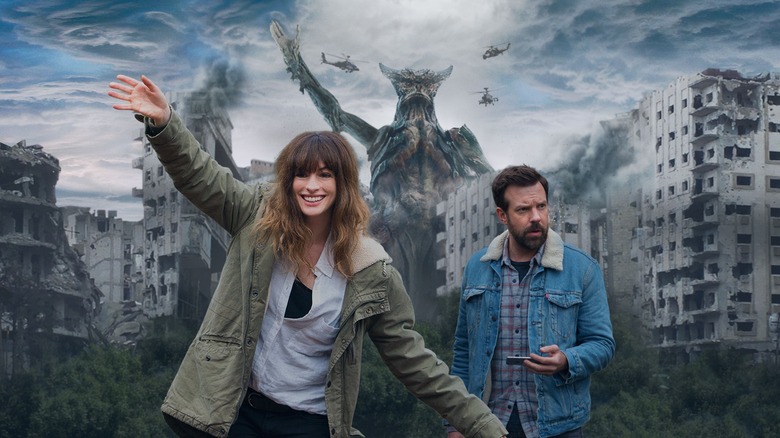
The kaiju genre isn't often known for stories about human emotion, but Nacho Vigalondo's "Colossal" balances the human story with the monster stuff pretty darn well. The movie revolves around Gloria (Anne Hathaway), a down on her luck writer struggling with alcoholism. After a bad breakup, Gloria moves back home and starts working at her friend Oscar's (Jason Sudeikis) bar. Simultaneously, a monster is attacking South Korea, a creature that seems to parallel Gloria's movements. This realization leads Gloria on a journey of both self-discovery and literal kaiju hijinks.
With its imaginative plot and fascinating twists and turns, "Colossal" is far from a conventional monster mash, but that's what makes it so unique. From Hathaway's fantastic performance to supporting players like Sudeikis who give an extra kick to the film's final blows, it has easily the best acting of any kaiju movie. But the coolest element here is Bear McCreary's fantastic score, which compliments the thrilling monster sequences from start to finish, proving how music can really heighten a monster's power.
Gamera, The Giant Monster
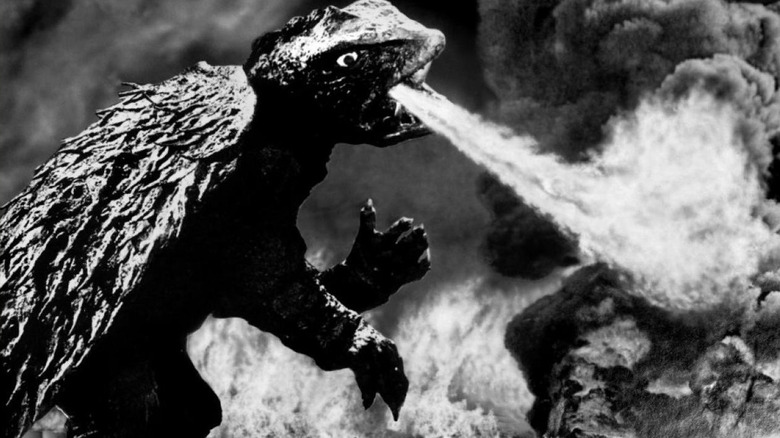
While most people don't know him as well as Godzilla and King Kong, there's no denying the impact that Gamera has had on the giant monster genre. "Gamera, The Giant Monster" begins with a mysterious aircraft shooting down an American jet, causing a mythical prehistoric creature to reawaken from his slumber. Such an event results in the typical destruction, the expected government concern, a young boy becoming attached to said monster, and some of the wackiest examples of kaiju cinema. Very few monsters can fly, spin, and shoot fireballs like the titular star of this movie.
While not the best film in the franchise, it's essential to recognize the significant influence "Gamera, The Giant Monster" had on not only future installments in the Gamera series but the kaiju genre as a whole. This movie introduced the concept of these monsters being defenders of children, making them inviting to a younger demographic. And while this and other Gamera films suffer from having annoying kids at the center, there's no denying that a world without Gamera would be a very, very sad one.
King Kong (2005)
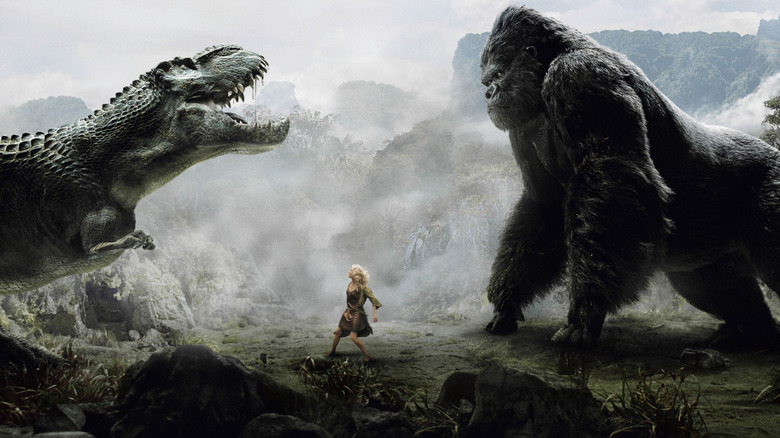
Serving as both a tribute to the past and a showcase for the present, Peter Jackson's 2005 remake of "King Kong" is one of the purest definitions of cinematic magic. From the sweeping, grand images on display to the powerhouse performances of the cast, Jackson's love for the original material clearly shows in every frame. While the movie does have flaws in its pacing and narrative structure, it clearly has more successes than failures.
But what makes Jackson's version of "King Kong" so special is the performer behind the Eighth Wonder of the World, Andy Serkis. While many memorable creature actors appear in movies on this list, Serkis' performance is a powerful and memorable portrayal that can still be seen through the layers of CGI. When combining the charming details Serkis brings to the performance with the beautiful skills of the artists at WETA Digital, it's easy to see why this version of Kong has remained a fan favorite.
Cloverfield
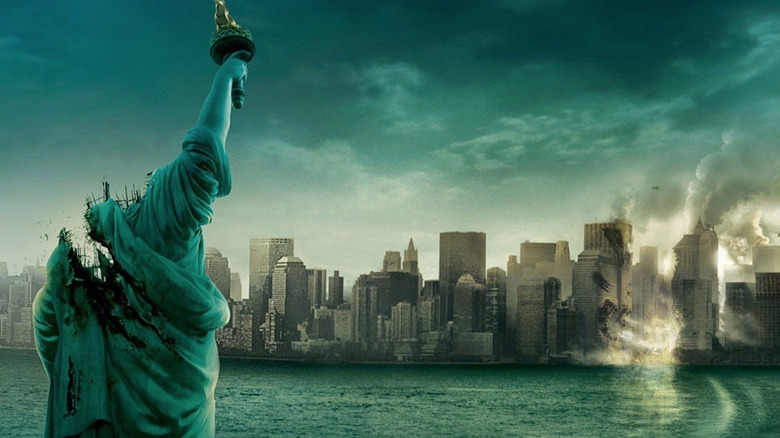
With its unique cinematic presentation, 2008's "Cloverfield" remains a fascinating entry in the kaiju genre. Directed by Matt Reeves and produced by J. J. Abrams, the film tells its story using a found footage format, allowing audiences to witness firsthand what it would be like to be in the midst of a giant monster attack. With its New York City setting and exciting ensemble of actors, including Lizzy Caplan and T. J. Miller, there's no denying that "Cloverfield" makes some bold choices right out of the gate.
Though not a flawless film, "Cloverfield" deserves a spot on this list simply for the imaginative way it takes viewers along for the ride. Though found footage movies have come and gone since its release, it's a landmark entry into the giant monster genre that deserves respect for its impressive cinematic achievements. While the monster at its center might not be the most interesting compared to the others on this list, the presentation of its destruction makes "Cloverfield" a significant watch.
Destroy All Monsters
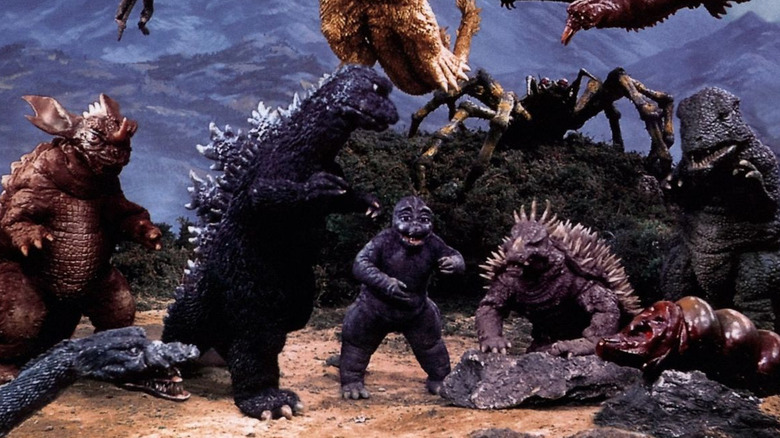
A monster mash like no other, Toho's "Destroy All Monsters" is a legendary movie for a reason. Not only was it the first time that nearly all of the studio's iconic kaiju appeared in a single film, but it also established the trimmings and trappings of the genre that fans have come to love. In the Ishirō Honda-directed flick, the kaiju are enjoying their life on Monster Island. Suddenly, a group of aliens take control of the monsters and send them to various cities across the globe. As one can guess, chaos ensues.
Known for a memorable fight sequence during the third act, "Destroy All Monsters" set the bar for the kind of wacky hijinks kaiju films can get into in order to achieve their singular goal: getting all the monsters to battle it out. And what a glorious sight it is to see the likes of Godzilla, Mothra, Rodan, and more fight in various ways. This is the kind of stuff that has sparked fans' imaginations for decades, and that continues to provide the foundation for what an all-out monster brawl can and should be.
Godzilla Vs. Destroyah
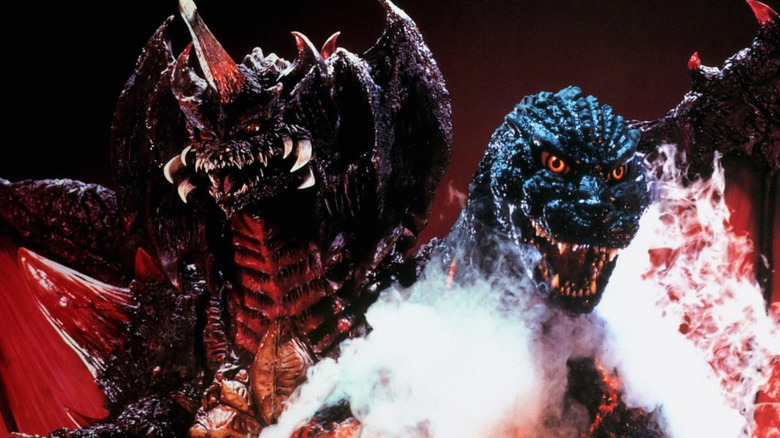
The final entry in Godzilla's Heisei era, "Godzilla vs. Destroyah" is a kaiju movie that doesn't hold anything back. In the film, Godzilla's nuclear reactor-like heart is close to having a meltdown, meaning that his death will result in cataclysmic destruction. Simultaneously, new creatures emerge from the ocean, which evolve into one massive being known as Destroyah. With two giant-sized threats on their hands, it's up to series heroine Miki Saegusa (Megumi Odaka) and the Japanese government to figure out a way to save everyone from the creatures.
From the brutal destruction of both its setting and its characters to the design of its demon-inspired villain, "Godzilla vs. Destroyah" is a movie that embraces its quirks head-on. It's a beautiful love letter to the Godzilla franchise and a fitting conclusion to what is arguably the best era of Toho's King of the Monsters. Even with all of its outlandish choices, it's an emotional monster rumble that'll remind any viewer why they love both this character and genre.
The Host (2006)
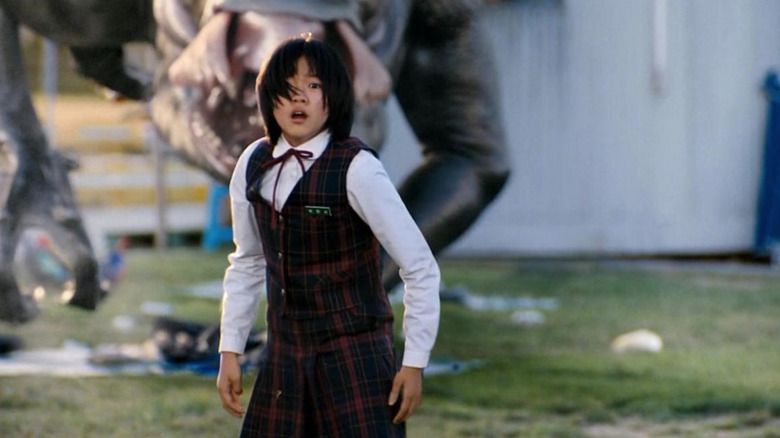
Directed by Academy Award-winner Bong Joon-ho, "The Host" tells the story of a monster who emerges after an American military pathologist orders a chemical dump in South Korea's Han River. The film then follows Park Gang-du (Song Kang-Ho), an offbeat local vendor whose daughter is captured by the creature. Now it is up to him (and whoever will join him in his quest) to rescue his daughter from the clutches of the film's central monster.
While quite different from the other monster movies on this list, "The Host" is like the fine dining of kaiju cinema. Not only is Bong Joon-ho a world-class filmmaker, but he's an excellent storyteller, one who bridges the gap between art-house cinema and popcorn-munching spectacle. And while certain aspects of this movie (ie, the CGI) haven't aged quite as well as its core narrative, it's hard to ignore what Bong Joon-ho was able to accomplish with this fascinating creature feature.
Ghidorah, The Three-Headed Monster
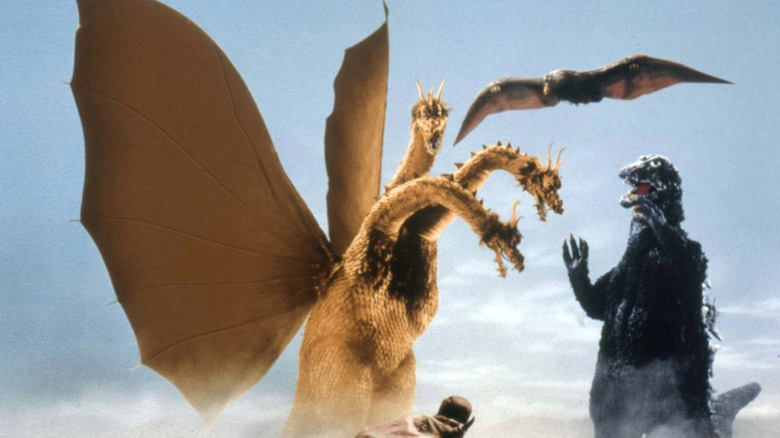
Featuring Godzilla's most fearsome foe, "Ghidorah, the Three-Headed Monster" remains one of the most essential entries in Toho's iconic franchise. The story starts with an alien princess who comes down to Earth to warn its people about a giant monster (Ghidorah). Although the Japanese government doesn't want to admit it, the only hope for survival comes in the form of three kaiju: Godzilla, Rodan, and Mothra. Throw in some James Bond-style secret agent subplots, the return of Mothra's twin fairies, and one heck of a final showdown, and you end up with this very intriguing slice of kaiju movie history.
Considering that "Ghidorah, the Three-Headed Monster" was the second giant monster film Toho made in 1964, it's impressive to see how well it turned out. Sure, like any of the later Shōwa-era Godzilla films, it absolutely reeks of silliness. But with the introduction of Ghidorah and the first of many monster rumbles, "Ghidorah, the Three-Headed Monster" is a definitive entry in the Godzilla franchise.
Gamera: Attack Of Legion
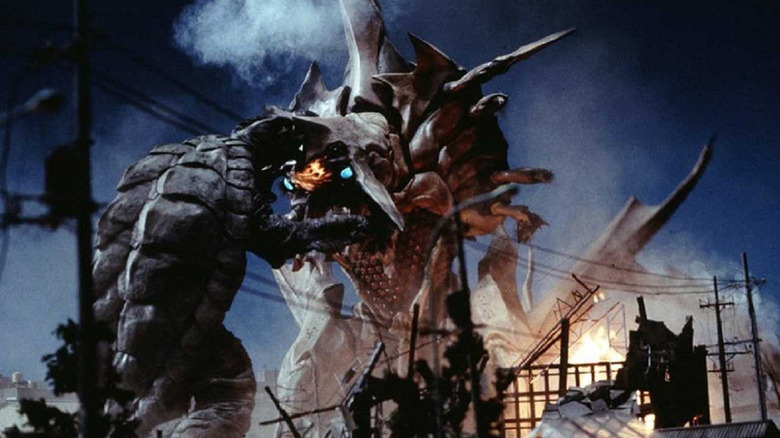
While the Heisei-era Gamera movies are entertaining from start to finish, "Gamera: Attack of Legion" is in a class all its own. The story begins right after the events of the previous Gamera film, focusing on a meteor crash that brings extraterrestrial life to Japan. With strange creatures and plant life taking over Sapporo, all hope seems lost — until the mighty Gamera returns to save Earth once again. And though he's faced great adversaries in the past, none are as intense as the alien creature, Legion.
Though it contains the camp that the genre is known for, "Gamera: Attack of Legion" evokes the best of any Heisei-era kaiju film. With over-the-top human performances and outlandish visual references to other sci-fi properties, this movie knows exactly what it's doing. But with its jaw-dropping tokusatsu-style special effects (especially the Mother Legion creature), heart-pounding fight sequences, and top-tier Gamera moments, this is a kaiju rumble that should not be underestimated.
Godzilla Vs. Biollante
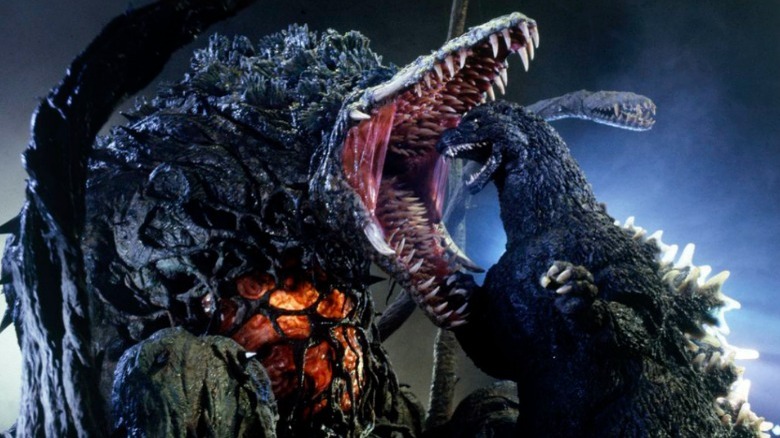
The second film in Toho's Heisei-era Godzilla series, "Godzilla vs. Biollante" is quite the cinematic trip. The plot revolves around a scientist who mixes the cells of his late daughter with those of a rose. In a freak accident, Godzilla's DNA is combined with the flower, creating a creature known as Biollante. This results in pure kaiju wildness from start to finish.
Right from the start, "Godzilla vs. Biollante" throws a lot at its audience. There's a girl who can psychically communicate with plants and kaiju, rival companies sending secret agents to gather Godzilla's DNA, and a man grieving the loss of his child. Yet, even with all of that plot, the movie still finds a way to produce one of the most unique monster rumbles ever set to celluloid. With both Biollante's beautiful design and Godzilla's immortal charm, this is a kaiju flick that deserves all the respect.
Shin Godzilla
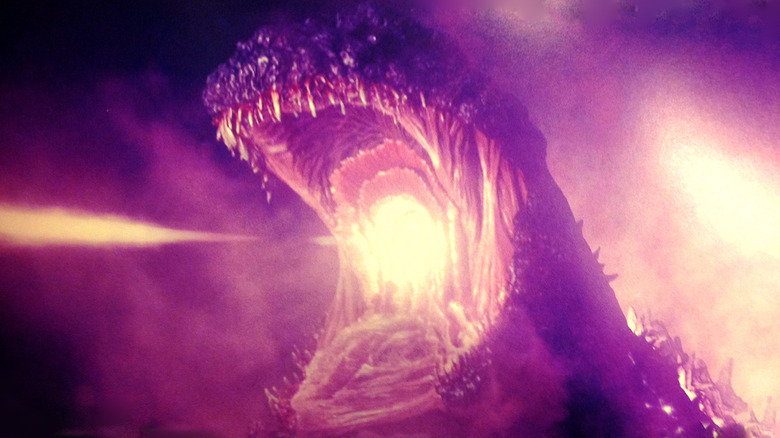
Hideaki Anno's "Shin Godzilla" is a magnificent piece of kaiju filmmaking on many levels. Not only does its haunting imagery pay tribute to the terrifying aesthetics of the original "Godzilla," but it also adds new, horrific lore to the already iconic King of the Monsters. Acting as a reimagining of the series, the film follows the public discovery of the titular creature, showing the monster's transformation into a towering titan and the destruction he wreaks on Japan.
While the original "Godzilla" served as an allegory for the atomic bombing of Hiroshima and Nagasaki, Anno's film is a pop-culture reflection of more recent disasters in Japanese history. The director plays with his typical themes of death, destruction, and modern Japanese politics, making "Shin Godzilla" feel both similar and far removed from a typical kaiju rumble. But Anno's unique perspective makes "Shin Godzilla" not only one heck of a giant monster movie, but also an essential piece of modern Asian cinema.
Godzilla (1954)
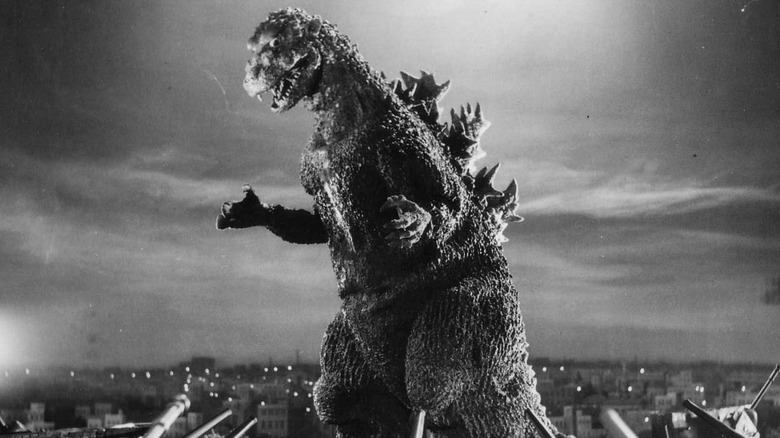
The film that created one of the most powerful movie monsters of all time, Toho's 1954 film "Godzilla" paved the way for the kaiju genre. Conceived by producer Tomoyuki Tanaka on a flight to Japan, Godzilla is a creature metaphorically born of the fear surrounding nuclear weapons. Considering the effects that the bombing of Hiroshima and Nagasaki had on Japan as a whole, a giant monster that represents those anxieties absolutely makes sense.
From the haunting cinematography by Masao Tamai to the even more bone-chilling score by Godzilla mainstay Akira Ifukube, the original "Godzilla" continues to inspire in both its achievements and its terrifying notions, but it's the work of director Ishirō Honda and special effects pioneer Eiji Tsuburaya that truly set the standard for all giant monster films to come. Without "Godzilla," many thrilling stories exploring our greatest fears and wildest dreams simply wouldn't exist.
King Kong (1933)
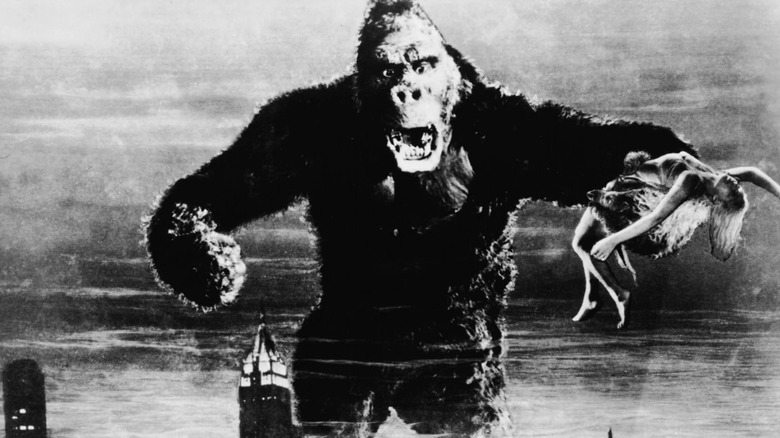
If "Godzilla" carried the baton for the monsters that followed, Hollywood's beloved giant monster flick, "King Kong," set the stage. In the 1933 classic, audiences follow the adventures of fictional filmmaker Carl Denham, his lead actress Ann Darrow, and his crew as they seek out the mysterious Skull Island. Once they arrive, Ann is kidnapped by the gigantic beast, Kong, leading Carl and said crew to hunt and eventually capture the creature. The rest is movie history.
With its groundbreaking stop-motion animation by Willis O'Brien, along with great battles amidst skyscrapers and vast jungle settings, "King Kong" was a visual achievement right out of the gate. Yet, it's the humanity underneath the pioneering special effects that make this film a landmark piece of both pop culture and art as a whole. With its equally memorable dialog and images, "King Kong" continues to inspire film fans of all ages to this day.
Read this next: The Ultimate Bigfoot Movie Ranking: 47 Yeti, Sasquatch, And Abominable Snowman Movies Ranked
The post The 15 Best Kaiju Films Ranked appeared first on /Film.
from /Film https://ift.tt/3FZvoHk
via IFTTT
Comments
Post a Comment